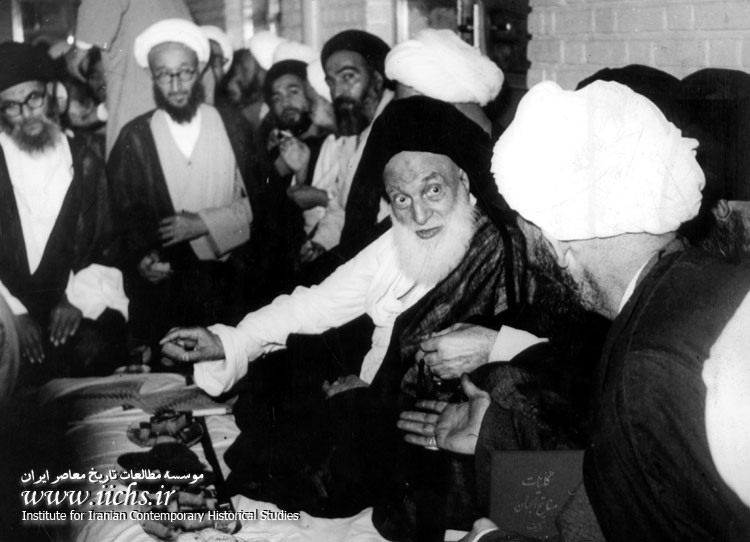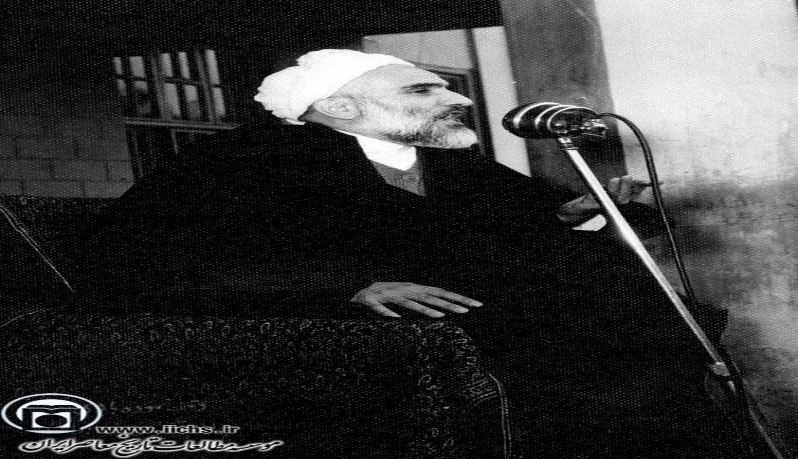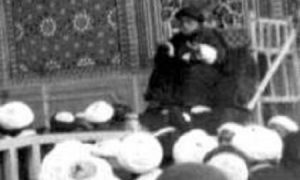An overview of the struggle of the source of religious authority against Baha’ism
The Baha’is who once had no place not only in the government but also in Iranian society, in the second Pahlavi period of time, gained a position that there was no unemployed Baha’i and even their number tripled and this expansion occurred while the source of religious authority of Shiite, Grand Ayatollah Seyyed Hossein Tabatabaee Boroujerdi was alive.
In the Pahlavi era, Baha’ism, supported by the government, expanded in addition to self-preservation; as after Israel, Iran was considered a safe resort for the Baha’is. Also, during the Pahlavi period of time, a give and take and cooperative relationship was established between the government and the Baha’is which was reflected in the determination of anti-religious policies by the government. The influence of the Baha’is in the government had reached such an extent that “there was no unemployed Baha’i and the number of Baha’is in Iran had tripled” during the era of Ayadi, a Baha’i physician of Mohammad Reza Pahlavi[1]. While Ayatollah Boroujerdi had started to fight against Baha’ism a long time ago. This article is a review of Ayatollah Borujerdi’s encounter with Baha’ism, who was more sensitive with Baha’ism than other scholars according to historical evidence.
آنچه در ادامه می خوانید
Ayatollah Borujerdi and Baha’ism (1320-1332 S.H.)
The influence of Baha’is in the administrative levels of the country had started years before 1320 S.H. This influence was accompanied by anti-Islamic and Baha’i proselytizing, and this caused Shia scholars and religious people to be concerned. After returning from Najaf to Borujerd, Ayatollah Borujerdi who was respected by the public and the people of the west of the country and was busy teaching, organizing congregational prayers and leading people, and solving people’s affairs concerning religious law noticed that Baha’is were heavily busy proselytizing in Borujerd especially in government offices. This caused him to start his confrontation against Baha’ism. He first tried to stop their activities which were increasing day by day through legal means, but when he was faced with the indifference and negligence of the center, he left the city in protest against that situation. When the news of his departure spread in the city, the people of the city and the surrounding areas held a meeting and a demonstration in the telegraph office. Following this action of the people, the government felt threatened and tried to make Ayatollah Borujerdi to return to the city. For this purpose, it closed open Baha’i circles and gatherings are and transferred the deviant people in the offices[2]. In this way, Ayatollah Boroujerdi returned to the city.

Grand Ayatollah Boroujerdi in a gathering of his companions and some students in Qom
In the last years of his residence in Boroujard (1320 to 1324S.H.), he gave a speech on the pulpit in the month of Ramadan about the Mahdism narrated by Sunni and Shia scholars and rejected the views of the Baha’is in a reasoned manner [3]and after entering Qom city, he advised Ayatollah Safi to write a book with the same reasoned style citing popular and special traditions about Imam Zaman (P.H.) relying on The same argumentative method in fighting against Baha’ism in Borujerd. This also led to the writing of the valuable book “Muntakheb al-Athar”[4]. Additionally, he emphasized on sending representatives to different cities to proselytize; as according to Ayatollah Sobhani in 1331 S.H., he sent scholars such as Hossein Ali Montazeri, Ibrahim Amini and Ahmadi Shahroudi to Faridan Isfahan to neutralize the Baha’i proselytizing.[5]
After the coup of 1332
After the coup on Mordad 28, 1332 S.H., the Baha’i cult gained more influence in governmental institutions. This issue angered the people and Ayatollah Borujerdi. As after the month of Ramadhan in 1333 S.H., Ayatollah Boroujerdi demanded the expulsion of Baha’is from government offices and national enterprises during an interview with “Keyhan” newspaper. [6] Additionally, he wrote a letter to Hojjat-ul-Islam Phalsfi and asked him to protest during his meeting with Mohammad Reza Pahlavi. In this letter, it was stated: “… not long ago, a letter was received from Abadan from some humble lawyers and they stated that almost the administration of Abadan oil affairs has been done by the Baha’i cult. Yesterday, another letter from some lawyers was received, which confirmed the first letter. I do not know where the situation in Iran will end in. It’s as if the leaders of Iran’s affairs have fallen into a deep sleep that no sound, even formidable, will wake them up. I see the end of Iran’s affairs from this despicable cult too much. There are too many of them in governmental offices that they have control the affairs and ministry of justice does not have the courage to punish one of them who has been proven to be the murderer of five innocent Muslims. I don’t know whom we should talk and with which bell we should wake up the sleeping ones. I don’t think there will be any benefit. I am completely despondent about the reforms of this country”.[7]
Ayatollah Boroujerdi commissioned Hojjat al-Islam Falsafi to fight against Baha’ism. According to the order of Ayatollah Boroujerdi, Falsafi also tried to reveal the nature of Baha’ism to everyone by giving a speech on Tehran radio. With the support of Ayatollah Borujerdi and the statements he issued, the people’s movement against the Baha’is rose and the speeches of Hojjat al-Islam Falsafi, a famous preacher, finally caused Hazira Al-Quds (the holy place of the deviant cult of Baha’ism in Tehran)[8].
In a letter to Hojjat-ul-Islam Falsafi, Ayatollah Borujerdi asked him to convey his objection to this situation to the Shah in a meeting with Mohammad Reza Pahlavi. It was stated In the letter: … not long ago, a letter was received from Abadan from some humble lawyers and they stated that almost the administration of Abadan oil affairs has been done by the Baha’i cult. Yesterday, another letter from some lawyers was received, which confirmed the first letter. I do not know where the situation in Iran will end in. It’s as if the leaders of Iran’s affairs have fallen into a deep sleep that no sound, even formidable, will wake them up. I see the end of Iran’s affairs from this despicable cult too much. There are too many of them in governmental offices that they have control the affairs and ministry of justice does not have the courage to punish one of them who has been proven to be the murderer of five innocent Muslims.”
At first, the Shah and the court kept silent against this situation in a tactical way, but when some of the Shah’s advisors warned him that if the clerics won this fight, he should be worried about a serious threat from them.[9] Even after the destruction of Hazira Al-Quds, a representative was sent to Ayatollah Boroujerdi and said that the American Embassy had asked the Shah not to have anything to do with religious minorities. Because we consider it our duty to protect the security of minorities. If you can’t keep them safe, we will try to keep them safe; therefore, continuing this issue is against our dignity.[10]

Hojjat al-Islam wal-Muslimeen by Haj Sheikh Mohammad Taqi, Falsafi on the pulpit (1330s)
These actions caused Ayatollah Boroujerdi’s severe dissatisfaction with Mohammad Reza Pahlavi and; as a result, distrusted him more. As he did not allow government officials to enter his home or treated them with complete disregard. Hojjat al-Islam Falsafi has said about this issue: “I know that when the position of the Baha’is was raised as an important anti-Islamic matter and Ayatollah Borujerdi’s successive messages were ineffective in various ways, he repeatedly said that this situation was unbearable for me; because he was very upset about the interruption of the fight against the Baha’is. After that, he no longer trusted the government system”[11].
He also said in an interview with “Keyhan” newspaper about Ayatollah Boroujerdi on Ordibehesht 16, 19, and 20, 1334 S.H.: “The Excellency Ayatollah Boroujerdi, Ayatollah Behbahani and clerical circles pay full attention to the boycott of the Baha’i cult from Iranian society and are continuously in contact with the court, the government and parliaments to destroy their works. This activity, which is of interest to public opinions will be followed until peace of mind is created in Muslims”.[12]
End of speech
Ayatollah Boroujerdi showed sensitivity towards Baha’ism and followed his encounter with this cult guarding Islam. He had taken up campaign against Baha’ism in different ways, but his proselytizing activities and exposing the face of Baha’ism to the people were among his most important actions, although the campaign of this great source of religious authority of the time was not limited to this only, and was pursued through consultations and political warnings to the statesmen as well. It was looked into. Even though Ayatollah Boroujerdi was desperate the government to join in this campaign, he did not refuse any opportunity to put it in the true way and he continued his personal and cultural campaigns to the end of his life.
[۱] Seyyed Yasem Gourabi, “Practical life of Grand Ayatollah Boroujerdi in the field of politics”, Political Sciences, Bagherul Uloom University, Vol. 51 (Autumn 1389S.H.), p. 119.
[۲] Ali Devani, the glorious of Islam, vol. 12: Grand Ayatollah Boroujerdi…, Tehran, the Center for the Islamic Revolution Records, fourth edition with revisions and additions, 1379 S.H., pp. 109-110 and 112.
[۳] Quoted by Ayatollah Sobhani in: “Ali the truth-seeker, I wish the critics were measured?”, Iran Perspective, vol. 5 (Khordad & Tir 1379 S.H.), p. 47.
[۴] Ibid.
[۵] Ibid.
[۶] Saeed Zahed Zahedani, Baha’ism in Iran, Tehran, Islamic Revolution Records Center, p. 250.
[۷] Ali Devani, Memoirs and Campaigns of Hojjat-ul-Islam Falsafi, Tehran, Islamic Revolution Records Center, p. 199.
[۸] Mohammad Lak Aliabadi, The Model of Leadership, Qom, Ismat, 1378 S.H., p. 230.
[۹] The Islamic revolution according to memoirs (from the leadership of Grand Ayatollah Boroujerdi to the uprising of 15 of Khordad), Memoirs and Oral History Compilation Group, Tehran, Center for the Islamic revolution documents,1382S.H., p.42.
[۱۰] An interview with Ayatollah Seyyed Muhammad Baqer Soltani Tabatabaee, Hozeh magazine.
[۱۱] The Islamic revolution according to memoirs (from the leadership of Grand Ayatollah Boroujerdi to the uprising of 15 of Khordad), Memoirs and Oral History Compilation Group, Tehran, Center for the Islamic revolution documents,1382S.H., p.42.
[۱۲] Ali Dawani, Ayatollah Brougerdi and the Baha’is, worried about influence, Ayyam the special issue of the contemporary history, (Jam-e-Jam newspaper) No.29 , p.51).






